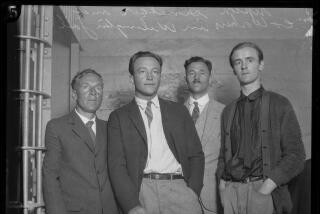Rev. Leon Sullivan; His ‘Principles’ Stressed Corporate Fairness to Blacks
- Share via
The Rev. Leon Howard Sullivan, one of the first African Americans to sit on the board of a major American corporation and the author of what came to be known as the Sullivan Principles, a code of conduct for American businesses in dealing with the apartheid government of South Africa, died Tuesday night of leukemia. He was 78.
In ill health for some time, Sullivan died in a Scottsdale hospital. He moved to Arizona from Philadelphia in the early 1980s and created the International Foundation for Education and Self-Help.
Sullivan combined the black economic nationalism of A. Philip Randolph, the political acumen of Adam Clayton Powell Jr. and the diasporic dreams of W.E.B. DuBois. His life’s work was a series of unconventional partnerships: between African Americans and Africans, corporate boards and liberation movements, and secular economic development and his ministry.
“He was really was a father figure in this whole movement for economic and social equality and justice,” said Kweisi Mfume, president of the NAACP.
A civil rights warrior who fought for conscientious capitalism, Sullivan preached the message “we help ourselves” in hardscrabble African American communities. And while calling on individuals to work hard, Sullivan urged corporate America to diversify the work force.
Sullivan pioneered mass boycotts and inspired later movements to do the same.
“He brought the idea of ministers leveraging consumer dollars for jobs and justice to Dr. Martin Luther King,” said Rainbow/PUSH Coalition President Jesse Jackson.
While sitting on the board of General Motors, Sullivan led the call for corporate divestment from South Africa’s apartheid regime. The set of principles he set forth during that effort would become one of the cornerstones of corporate social responsibility and, in 1999, the United Nations Global Compact, a commitment by the world business community to support human rights and environmental responsibility.
Sullivan was born into a broken home in what he called “a dirt alley” in Charleston, Va. A gifted athlete, Sullivan won a basketball scholarship to West Virginia State College, but had to work his way through school at a steel mill after injuring his knee. Even before his graduation in 1943, Sullivan became pastor at two baptist churches. After college he met Adam Clayton Powell, then pastor of the Abyssinian Baptist Church in Harlem and a future congressman.
Powell invited him to New York, where Sullivan worked on his legendary congressional campaign. In New York, Sullivan became the first black American coin box operator for Bell Telephone Co., and he met the great black entrepreneurial nationalist, A. Philip Randolph, president of the Brotherhood of Sleeping Car Porters, the first African American union.
“Mr. Randolph tutored me as a father would, in movement tactics and philosophy,” he wrote in his 1969 book “Build Brother Build.” “It was from him that I learned much of the art of massive community organization, and he taught me the meaning of nonviolent direct action.”
Sullivan worked on the National March on Washington Movement and preached on Harlem street corners, often under a large American flag. Even in the early years of his career, Sullivan showed his ability to cross into different worlds, hanging out with boxers Sugar Ray Robinson and Joe Louis, organizing a New York gang truce and consulting regularly with Mayor Fiorello La Guardia. His relationship with the mayor eventually resulted in the hiring of 100 black police officers in a single month.
Sullivan would receive additional degrees from Union Theological Seminary and Columbia University and Virginia Union University. He would also become pastor of First Baptist Church in South Orange, N.J., and marry Grace Banks, who survives him. He is also survived by a daughter, Hope Sullivan Rose; son, Howard; daughter Julie; and seven grandchildren.
It was in Philadelphia, where he was pastor of Zion Baptist Church, that Sullivan’s vision of economic justice blossomed. Shortly after his arrival, Sullivan organized 20,000 people to fight juvenile delinquency. From his pulpit, Sullivan challenged black people to be more self-sufficient.
But jobs for black people were scarce, and automation had begun to cut into even those low-wage jobs traditionally held by unskilled African American labor. In response, Sullivan organized Philadelphia’s black churches into a boycott of companies with discriminatory employment practices. “Don’t buy where you can’t work,” he told his followers.
Four hundred churches participated in the boycott, and in 1961, 3,000 new jobs were created in the city. When Sullivan saw that many African Americans were unprepared for the new jobs open to them, he created what would eventually become an international network of job training and placement programs. Echoing the philosophy of his mentor, Randolph, Sullivan asserted: “Integration without preparation is frustration.”
In 1971 Sullivan began what would be a 20-year tenure on General Motors’ corporate board of directors. Described by his colleagues at GM as the “Lion of Zion” and the “conscience of the board,” Sullivan broadened his vision and GM’s priorities. Roderick D. Gillum, vice president of corporate relations, said Sullivan worked to establish diversity programs at GM and made the corporation more sensitive to “the human elements.”
“He always wanted to know about the human elements behind running a global business,” Gillum said. “He always asked about people.”
In 1977 he wrote the Sullivan Principles, which called for U.S. companies operating in South Africa to integrate corporate facilities, establish equal and fair employment practices and increase the number of black managers.
“When the big idea was to boycott South Africa, Rev. Sullivan’s point was that when blacks emerged they had to have infrastructure,” Jackson said. “He argued that if you run [out] all the companies, when black South Africans were liberated they would take over a shell. In the end these were not conflicting positions--[Nelson] Mandela had a long appreciation for Sullivan, as did the rest of the African National Congress.”
Eventually, Sullivan did call for full divestment from South Africa, a position that alienated some of the 100 U.S. companies that had signed on to his original proposal.
After the fall of apartheid, Sullivan continued to work in Africa, organizing several summits among African and African American leaders. He drafted a new set of corporate principles advocating human rights and environmental justice, and was advising U.N. Secretary General Kofi Annan on a new African initiative.
“Sullivan’s principles were the practical expression of the secretary general’s Global Compact,” said Jeorg Kell, a senior aide to Annan. “We were planning to do a lot of joint things together in Africa.”
As of April 22, more than 250 companies, including Coca-Cola, British Airways and Texaco, had endorsed Sullivan’s new principles. He was planning community development projects aimed at stabilizing Nigeria’s work force.
“He realized that companies increasingly are motivated not to just exploit for the short run, but want to have a foothold in major markets for the long run,” said Kell. “He thought that companies community-building there on a large scale--building hospitals, schools in a focused manner--is a matter of enlightened self-interest.”
But throughout Sullivan’s travels and many international efforts, the church remained his home. Kell related a recent address Sullivan delivered at the United Nations in which he explained his principles and told the world’s representatives that corporate social responsibility flowed not from Annan or from any corporate leaders, but from God.
series of quotes about sullivan to run with the art
‘He was really was a father figure in this whole movement for economic and social equality and justice.
--Kweisi Mfume
NAACP president
‘He brought the idea of ministers leveraging consumer dollars for jobs and justice to Dr. Martin Luther King.’
--JESSE JACKSON
Rainbow/PUSH Coalition president
‘He always wanted to know about the human elements behind running a global business. He always asked about people.’
--RODERICK D. GILLUM
GM vice president of corporate relations
More to Read
Sign up for Essential California
The most important California stories and recommendations in your inbox every morning.
You may occasionally receive promotional content from the Los Angeles Times.












